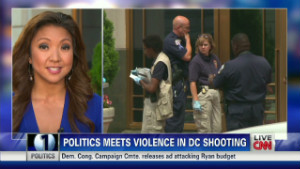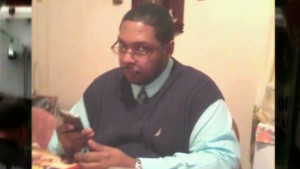Washington (CNN) -- After years of thinking it over, Floyd Corkins finally had a plan.
He'd bought a gun and learned how to use it. He'd loaded three magazines. And he had stopped by Chick-fil-A to pick up 15 sandwiches, which he planned to smear in the dying faces of staffers he expected to kill at the Family Research Council in Washington.
It would be a statement, he said, "against the people who work in that building," according to documents filed in U.S. District Court, where Corkins pleaded guilty on Wednesday to three charges related to the August shooting at the conservative policy group.
Corkins told Judge Richard Roberts that he hoped to intimidate gay rights opponents.
The shooting came amid intense debate over remarks against gay marriage by an executive with the Atlanta-based Chick-fil-A restaurant chain and the company's support for groups considered hostile to gay rights.
The research council, a Christian group that focuses on family, anti-abortion and religious liberty issues and views homosexuality as harmful, backed Chick-fil-A in the ensuing controversy.
"They endorse Chick-fil-A and also Chick-fil-A came out against gay marriage, so I was going to use that as a statement," prosecutors quoted Corkins as telling investigators.
 Blame game grows in FRC shooting
Blame game grows in FRC shooting  FRC shooting victim: Instincts took over
FRC shooting victim: Instincts took over Corkins, 28, pleaded guilty to committing an act of terrorism while armed, interstate transportation of a firearm and ammunition, and assault with intent to kill while armed.
Prosecutors dropped seven other charges.
The charges carry sentences of up to 70 years in prison. However, the sentence could be shorter because Corkins has no prior criminal record.
Corkins will be sentenced April 29, prosecutors said.
The act of terrorism charge alleges that Corkins wanted to kill building manager Leo Johnson and other Family Research Council employees "with the intent to intimidate and coerce a significant portion of the civilian population of the District of Columbia and the United States."
It is a District of Columbia law passed in 2002 but never before used.
According to prosecutors' account of the attack filed on Wednesday, Corkins got into the Family Research Council's building by telling Johnson that he was there to interview for an internship.
After Johnson asked for identification, prosecutors say, Corkins reached into his backpack, retrieved a handgun and leveled it at Johnson's head.
Johnson ducked and lunged at Corkins before he could fire a shot, according to prosecutors.
As the two struggled, Corkins fired three times, hitting Johnson once in the arm, before the building manager was able to wrestle him to the ground, disarm him and hold him at gunpoint until police arrived.
As he lay on the ground, Corkins said something to the effect, "'It's not about you.' It's about the FRC and its policies," according to the prosecution account.
Corkins -- who had chosen the research council as his target after finding it listed as an anti-gay group on the website of the Southern Poverty Law Center -- had planned to stride into the building and open fire on the people inside in an effort to kill as many as possible, he told investigators, according to the court documents.
If he'd been successful and escaped, his plan was to go to another conservative group to continue the attack, prosecutors said. A handwritten list naming three other groups he planned to attack was found among his belongings, prosecutors said.
According to the documents, Corkins had thought about such an attack for years but "just never went through with it."
He purchased the gun used in the attack a week before at a Virginia gun store, where a French television crew taped him while doing a story about the widespread availability of guns in America, according to prosecutors.
He also went to the store the day before the attack for two hours of training.
U.S. Attorney Ronald Machen said Corkins' guilty plea "makes clear that using violence to terrorize political opponents will not be tolerated."
At the time of the shooting, Corkins lived with his parents in Herndon, Virginia, and volunteered at a Washington center for the lesbian, gay, bisexual and transgender community.
In August, FBI investigators said in an affidavit that investigators had interviewed Corkins' parents after the shooting, and they said their son "has strong opinions with respect to those he believes do not treat homosexuals in a fair manner."
The Southern Poverty Law Center has listed the Family Research Council as a hate group since 2010, pointing to what it describes as its anti-gay propaganda and legislative agenda.
On his nightly radio show on Wednesday, Family Research Council President Tony Perkins mentioned the plea deal and accused the Southern Poverty Law Center of playing a role in the shooting by inciting hatred and violence rather than fighting it -- a claim he has repeatedly made since the shooting.
"The Southern Poverty Law Center is dangerous. They are inciting hatred, and in this case a clear connection to violence," he said on the radio broadcast. "They need to be held accountable, and they need to be stopped before people are killed because of their reckless labeling and advocacy for homosexuality and their anti-Christian stance."
A spokeswoman for the center declined to comment on the plea deal or the research council's comments, but referred to a statement from the organization last year, standing by its designation of the Family Research Council as a "hate group."
"As people who care about human dignity, we have a moral obligation to call out the FRC for its demonizing lies and incendiary rhetoric about the LGBT community," the statement said. "The fact that we list the FRC as a hate group because of its demonizing propaganda does not make us the hateful one. Spreading demonizing lies is what is dangerous, not exposing them."
{ 0 comments... read them below or add one }
Post a Comment